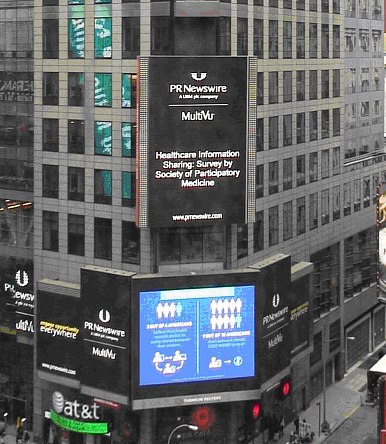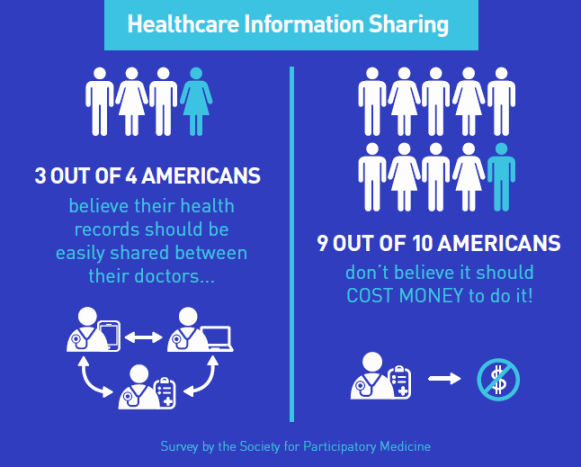National Survey Also Shows Americans Think Health Information Exchange Should be Free
Newburyport, MA, March 19, 2015 – Nearly 75 percent of American adults surveyed believe it is very important that their critical health information should be easily shared between physicians, hospitals and other health care providers, according to a survey released today by the Society of Participatory Medicine and conducted by ORC International.
“What this survey points out is that when critical health information can’t be shared across medical practices and hospitals, patients are put at risk,” said Daniel Z. Sands, MD, MPH, co-founder and co-chair of the Society of Participatory Medicine and a practicing physician.
The survey also revealed that 87 percent of respondents are overwhelmingly against any fees being charged to either healthcare providers or patients for the transfer of critical health information.
Several independent sources have noted that doctors are forced to pay between $5,000 to $50,000 to set up connections allowing them to transmit information to blood and pathology laboratories, health information exchanges or governments. Sometimes additional fees are charged each time a doctor sends or receives data.
In addition, nearly 20% of Americans surveyed felt that they, or a family member, experienced a problem receiving medical care because their health records could not be shared between different healthcare providers. Yet according to a survey conducted by PriceWaterhouseCoopers, 60% of providers face delays accessing current patient data and cited these limitations as a major barrier to effective use of health care information.
Dr. Sands went on to say, “We have the technology. What we need is for health care providers and systems developers to put patient interests ahead of business needs. None of them would exist were it not for the patients.”
According to David Nash, MD, MBA, Founding Dean of the Jefferson School of Population Health, Improving medical care in this country requires access to and use of data. Data from all of the different care settings will help provide a more comprehensive picture of a patient’s health and improve care across all sites. An open exchange of health information can provide access to “the right data at the right time so they can make the right decision,” he said.
About the Society for Participatory Medicine

The Society for Participatory Medicine is a 501(c)(3) not-for-profit membership organization devoted to promoting the concept of participatory medicine, a movement in which networked patients shift from being mere passengers to responsible drivers of their health, and in which providers encourage and value them as full partners. It does this through fostering conversation, influencing policy, advocating research, and educating patients, health care professionals, and others. Its members comprise stakeholders from across the health care continuum. Click here for more information about the Society for Participatory Medicine.
About the Survey
The ORC International Telephone CARAVAN® survey conducted March 5-8, 2015.
The study was conducted using two probability samples: randomly selected landline telephone numbers and randomly selected mobile (cell) telephone numbers. The combined sample consists of 1,011 adults (18 years old and older) living in the continental United States (505 male, 506 female.) Of the 1,011 interviews, 509 were from the landline sample and 502 from the cell phone sample. The margin of error for the sample of 1,011 is +/- 3.08 at the 95% confidence level.
Surveys are collected by trained and supervised US based interviewers using ORC International’s computer assisted telephone interviewing (CATI) system. Final data is adjusted to consider the two sample frames and then weighted by age, gender, region, race/ethnicity and education to be proportionally representative of the US adult population.
Contact: Marc Greene, 646-262-2516, marc.greene@sp2lc.com with any questions or for a full copy of the survey results.


